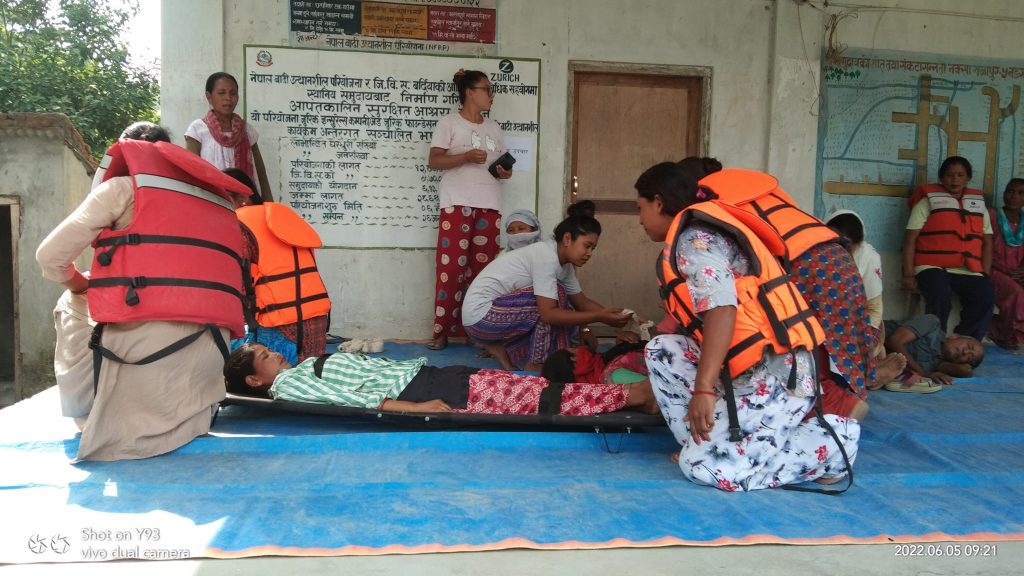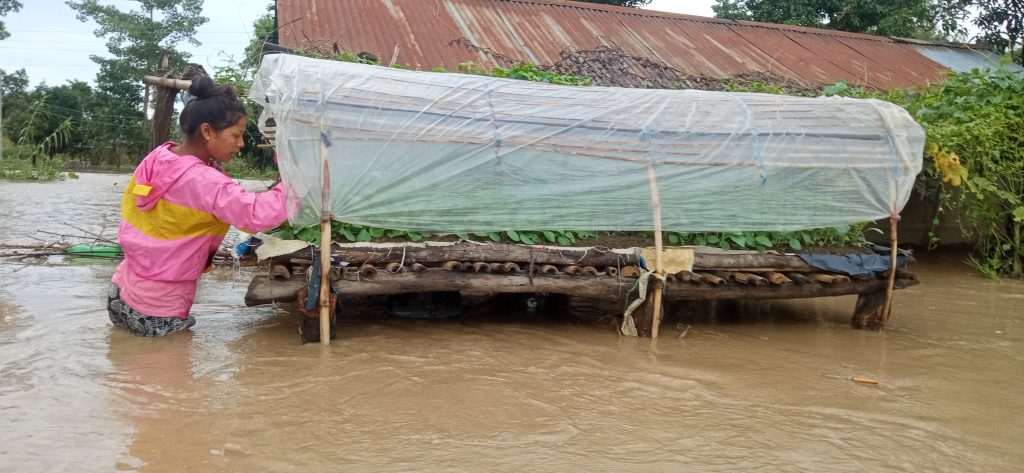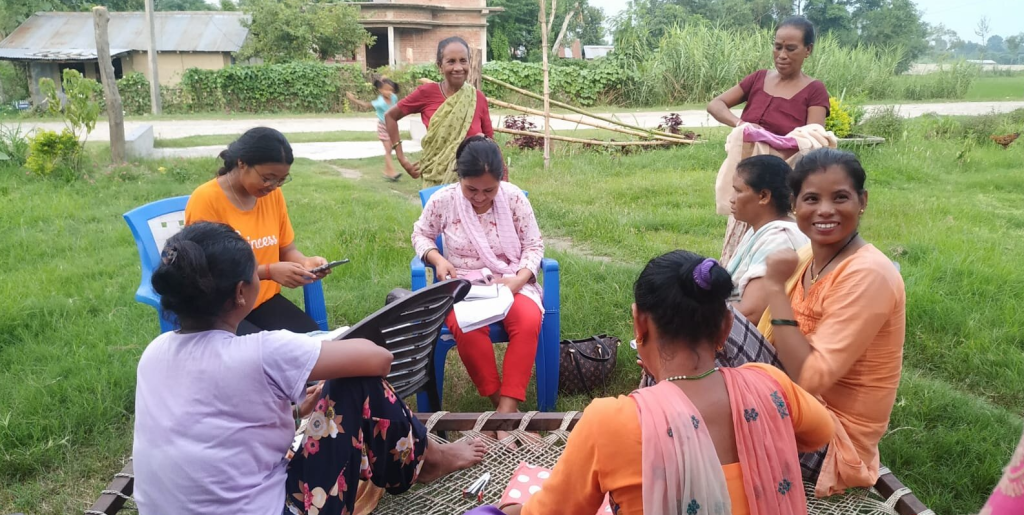A founding member of the Zurich Flood Resilience Alliance upon its creation in 2013, Practical Action has been working in Nepal to help communities build their capacity to prepare for, and respond to, flood events. In the first of a series of articles reflecting on ten years of resilience-building, Bikram Rana shares some of his team’s biggest achievements.
Long-term systemic change requires working across multiple sectors and scales. Being part of the Zurich Flood Resilience Alliance has allowed Practical Action to collaborate with partners and draw from shared research, advocacy and programming efforts. By improving policy, securing increased funding and delivering resilience-building interventions at the community level, we can realize our shared vision of a world in which floods have no negative impact on people’s and businesses’ ability to thrive.
The Alliance has expanded considerably across new organizations, countries and communities since its inception, but the challenges remain. Our work in Nepal is ongoing, but the long-term and flexible nature of the programme has allowed us to have a positive impact in flood-affected communities.

Increasing investment in climate smart risk informed development
Investment is key if lasting change at the community level is to be achieved. Through the efforts of Practical Action and others, local governments in Nepal are recognizing the need to invest in resilience-building work. Funds are now being earmarked expressly for this purpose, with the goal of allocating at least 5% of government budgets.
Our collaboration with the Nepalese Department of Hydrology and Meteorology (DHM) during the first phase of the Alliance (2013-2018) resulted in an investment of over over USD $17,000 for the operation and maintenance of the Karnali river gauge station, which measures river discharge on a real-time basis and connects the data generation system with the DHM’s flood early warning system. We’ve also co-invested with local goverments on for the construction of flood-safe shelters, raised granaries, drainage and dikes, as well as mock flood event drills in lower Karnali.
The Climate Change and Fragility Project, implemented by Practical Action and funded by UNEP alongside provincial and national goverments, is an example of how we have successfully leveraged co-fundings beyond local authorities. We have also leveraged funding from the International Centre for Integrated Mountain Development (ICIMOD) to develop a multi-hazard early warning strategy for Sudurpaschim Province.
Integration of flood resilience into policy and planning
In Nepal, the Alliance is working with all levels of government to institutionalize the Flood Early Warning System (FEWS) piloted by Practical Action in the Karnali basin in the early years of the project. The FEWS has been continuously strengthened ever since, and its use expanded for innovative solutions like Index Based Flood Insurance (IBFI) – more on which below.
At the sub-national level, Practical Action has identified policy gaps and supported local governments in developing solutions – for example, with the Local Disaster and Climate Resilience Plans of the Janaki and Madhuwan municipalities. Each year we also extend support to develop the Disaster, Preparedness and Response plans of the Bardiya and Kailali districts. At the request of their local governments, we also advised on the Disaster Risk Reduction (DRR) Strategic Plans of Action for Tikapur and Madhuwan municipalities.
At the national level, our loss and damage study has contributed to the development of the National Loss and Damage Framework. Practical Action has also engaged in all stages of the development process of the country’s National Adaptation Plan, and has worked with Alliance partners Mercy Corps and the IFRC to develop the Municipal Disaster Risk Governance Assessment Tool.
I found that the works done by Practical Action and its partners are very inspiring, impactful, and needs-based. Community engagement and trust in the project is very good. The province government is willing to go together with the initiative taken from Practical Action.
Lal Babu Kawar – Ministry of Home Secretary, Lumbini Province

Making flood resilience a reality
The answer to building resilience, in Nepal and elsewhere, lies in scaling and replicating successful examples of good practice. It all starts with the Flood Resilience Measurement For Communities (FRMC) approach, which collects detailed data at the community level on existing levels of resilience. Since its inception at the start of the Alliance, over 6.9 million data points have been created across multiple countries.
Here in Nepal, results from the FRMC process have been used by communities when negotiating in local government planning processes, and putting forward their resilience needs to other government agencies involved with irrigation projects. Results were also used in a Karnali River Management project, informing five local government fiscal plans, and in a USAID-supported project in the communities of Dang district.
Practical Action’s own interventions in Nepal are based on extensive consultation with communities. We work with schools to introduce flood resilience concepts into the curriculum, including class projects and field work on how to prevent the negative impacts of floods, as well as plans for continuity of education after a disaster.
As for the introduction of index-based (also known as parametric) insurance, the number of farmers participating has grown more than fourfold in just the first year. The success of the pilot scheme launched in lower Karnali has led to replication in Kutia River, Kailali, and there is great potential for further scaling.

Partnerships for the future
With extreme weather events increasing in frequency and severity, much more action is needed at all levels of government to ensure the long-term prosperity of flood-prone communities. Practical Action believes in “resilience that protects“, and will continue to collaborate with key partners to further reduce the risk of climate hazards faced by communities in Nepal.
Read the other entries in our ten-year anniversary series:
Never stop learning: ten years of the Alliance in Mexico
Community is key: ten years of the Alliance in Peru
To find out more about Practical Action’s work in Nepal, visit the Nepal Flood Resilience Portal.

Ramesh Gautam says:
Happy to be a part of these initiative